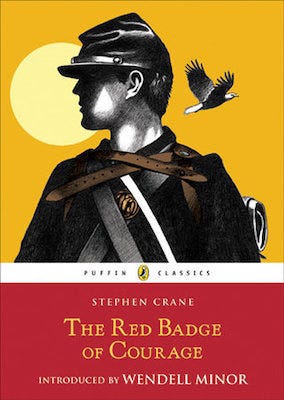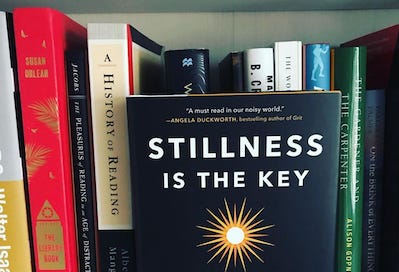What I’m Reading (No. 93): Stillness + War
My reading this week focused on concepts that are, in most cases, diametrically opposed: stillness and the total chaos of war. Sometimes, of course, war can include moments of stillness: the eerie calm after the final shell has hit the ground and a battlefield of slain soldiers haunts those who remain into a shocked silence, for instance. While reading common themes is interesting enough, reading about opposing forces often makes for an even more compelling study.
Ryan Holiday’s latest book, Stillness Is the Key, completes a Stoic self-improvement trilogy he started about five years ago. It’s his best writing yet.
I also finished, with just a bit of trudging, Stephen Crane’s 1894 classic, The Red Badge of Courage.
Also included this week is my listing of a slate of new-ish books that have caught my attention.
Let’s do it.
Stillness Is the Key by Ryan Holiday (2019, 260 pages)

“How different would the world look if people spent as much time listening to their conscience as they did to chattering broadcasts? If they could respond to the calls of their convictions as quickly as we answer the dings and rings of technology in our pockets?”
Holiday cranks out more books than just about any author out there, and manages to do it with quality writing that goes far deeper than most advice titles.
The gist of the book is simple: every religion, philosophy, and way of life in world history has strongly emphasized the practice of stillness — that seeking of quiet in the midst of chaos, that choice to be present and indistractable, that intentional reigning in of the passionate wild stag of workaholism.
If every way of life recommends some form of regular and intentional quietude, we’d be remiss to ignore it; stillness should in fact be sought out as an imperative to healthy and virtuous living.
The practice of stillness, though, is only getting more difficult as people increasingly become glowing reflections of their screens. I don’t need to drag on about that part; it’s becoming a cliched fact of life here as we approach the third decade of the 21st century.
Holiday, as is his recognizable style, pulls case studies from the annals of history about great leaders and top performers in order to figure out what it takes to find that stillness. Separated into three sections — Mind, Spirit, and Body — the book is easily (and quickly) digested, but will stay in your sphere of thought as you wrestle with how to carve more stillness into your own life.
My only complaint is that I wish Holiday would have actually put more of himself in the narrative. He offers numerous snapshots of famous figures, but those studies can be hard to relate to. One of the strongest chapters, in my opinion, is in fact the epilogue, in which Holiday just muses on the peacefulness of doing odd jobs around his farm — fixing fences, caring for geese (including one named Ryan Gosling), and shepherding a stubborn steer back onto his neighbor’s property.
Either way, this a book (and a series) well worth reading. You’ll feel more centered after reading it — like you can take a fresh, deep breath and have an excuse to put the phone down, shut the TV off, and take the earbuds out.
Some New Stuff That’s Good
Most of the books that publishers send me fall into the history or “lifestyle” categories (the latter being a lot of self-improvement, pop psychology, culture, etc.). I often skim or read the first third of these books to get a feel for if the titles would be a good fit for the AoM podcast. Below are a handful that I enjoyed. (FYI, the books I flat out don’t like rarely make it here in the newsletter; I don’t want to needlessly pan an author’s hard work). Anyways, the titles here are some I’ve gotten in the last few weeks and just didn’t have the time to dive into and fully read from start to finish (though I definitely will eventually):
Left to Their Own Devices by Julie Albright. Really interesting account of how Millennials (that’s me!) and especially Gen Z-ers are spurning traditional stabilizing institutions and becoming untethered from the world. To be fair to both generations, it’s not all bad, just very different.
Good Habits, Bad Habits by Wendy Wood. There’s been plenty of literature about habits in recent years; this is going to end up as one of the best. Truly. On my list to finish sooner rather than later.
Why Are We Yelling? by Buster Benson. Fun, engaging, and super practical look at the psychology of why we disagree (about everything from politics to what to watch next) and how to disagree better. Loaded with amusing visuals too.
The Program by Toni Natalie. Escaping NXIVM was one of the better podcasts I’ve ever listened to. So of course this book caught my attention. It’s not real well-written, to be honest, but the story itself makes up for it.
No Sweat by Michelle Segar. A slightly older title, but one I recently grabbed. The gist is that enjoyment is far better motivation for fitness than long-term goals. Will change how you look at exercise.
George Marshall: Defender of the Realm by David Roll. The author makes the convincing case for Marshall being one of the most consequential figures of the 20th century. Long and fairly detailed, but outstanding prose and convincing lessons in character and leadership.
The Red Badge of Courage by Stephen Crane (1894, 154 pages)

“At times he regarded the wounded soldiers in an envious way. He conceived persons with torn bodies to be peculiarly happy. He wished that he, too, had a wound, a red badge of courage.”
Hemingway called this work “one of the finest books of our literature.” His praise, along with my own Civil War obsession, made this novel an easy choice for me to pick up.
Broadly, it’s about a young man’s experience as a volunteer soldier for the Union. Our protagonist has a name — Henry Fleming — but is most often referred to as just “the youth” or some other slightly derisive label. While many Civil War novels are rife with detail (sometimes, it seems, as a way for an author to show off their knowledge), Red Badge doesn’t even give specific place names let alone detailed troop movements or casualty numbers. Rather, Crane writes an intense psychological portrait of what it’s like to be a soldier. Henry wrestles with his conscience almost constantly; primarily, will he win honor by earning a visible “red badge of courage” (a battle wound), or would he shrink in the heat of battle and acquire a scar of dishonor on his soul?
There are plenty of battle scenes to be had, but the reader spends a lot of time in Henry’s head. Rather than the overly valorous stories you often read about war, this is a realistic account of the battles that soldiers have within their own psyche. Will they display bravery in the gravest of circumstances? Or will they shrivel in the bigness of the moment? Many critics even today call it one of the most realistic war novels ever written (despite that lack of given detail). That should tell you how much of a probe it is into the headspace of a soldier.
As for my own reading experience: I enjoyed the first half immensely and breezed through it rather quickly. After that, it was a little slower going. Henry got a little bit annoying (rather than just interesting) and the story felt somewhat repetitive. Ultimately, though, it was a rewarding story and I enjoyed the ending. Certainly worth it for any Civil War buff.
That’s all for me this week. I’d love to hear what you’re reading, and thank you for the time and inbox space.
-Jeremy


